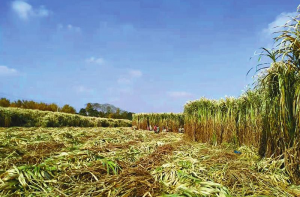Uncategorized
Juncao contributes to treatment of saline-alkali land in Jiangsu province
 By Bai Guangdi, People’s Daily
By Bai Guangdi, People’s Daily
Yancheng, which literally means the “City of Salt” in Chinese, is located in east China’s Jiangsu province. It is home to more than 455,000 hectares of coastal mud flat, which accounts for 70 percent of the total saline-alkali land of Jiangsu province.
Juncao, which in Chinese literally means “mushroom” and “grass”, can be used to grow edible and medicinal mushrooms. In 2019, Zhang Quanxing, academician of the Chinese Academy of Engineering and professor at the School of Environment of Nanjing University, visited a demonstration base of Juncao in Pingtan county, southeast China’s Fujian province, and learned about the plant’s strong vitality, as well as its high economic and ecological value.
Later, he shared with Lin Zhanxi, chief scientist of the China National Engineering Research Center of Juncao Technology, the idea of planting Juncao grass on the coastal mud flat of Jiangsu province.
In April 2021, Yancheng started growing Juncao grass. Over the past year, the plant has brought about positive changes to the coastal mud flat in the city.
A Juncao test field in Caomiao township, Dafeng district, Yancheng, has planted 10 hectares of Giant Juncao grass, a Juncao grass variety that can grow about five to six meters tall.
The test field was once a piece of salty and barren land where nothing was able to grow.
The Juncao grass is sweet itself, but it tastes salty now because it absorbs the salt in the soil and thus lowers the salt content in the soil, according to Liu Bobin, professor at the Yancheng Teachers University.
Good news from Pingtan county confirmed the impact of Juncao grass. In June this year, a piece of mud flat in Pingtan county saw its salt content drop from 14.7 per mille to 1.3 per mille since it was planted with Juncao grass three years ago by a research team led by Lin.
Yancheng, which has a different climate from Pingtan county, has a higher requirement for the cold hardiness of Juncao grass. At present, researchers are working to cultivate a new variety of Juncao grass that suits the natural environment in Yancheng, so as to better solve the issue of soil salinization in the city.
Apart from improving soil ecology, Juncao grass has also laid a solid foundation for enriching biodiversity in Yancheng.
Yancheng has the world’s largest nature reserve for the protection of elks. Statistics show that over 7,000 elks inhabit the areas along the coastal mud flat in the city, including some 3,000 wild ones.
To ensure the source of food for the animals has always been a topic studied by the nature reserve over recent years, and Juncao grass is considered a substitution for traditional feed.
The nature reserve designated a piece of land as a Juncao test field, and the grass harvested there is fed to some of the elks.
According to Jia Yuanyuan, deputy head of the Yancheng research institute of elks, the animals enjoy eating the Juncao grass. However, it takes further scientific experiments to prove whether Juncao grass can be taken as daily feed for elks, she added.
If the result is positive, it will not only significantly reduce the feeding cost of elks, but also enrich the source of food for wild elk populations, Jia said.
Besides, Juncao grass is also a rich reserve of food for migrant birds staying, breeding or wintering in the city.
The strong capability of Juncao grass in nitrogen and carbon fixation has opened up even bigger prospects for the plant.
It is learned that different from other crops that take in nitrogen from the outside, Juncao grass is able to fix nitrogen in the soil through its photosynthesis, which improves the fertility of the soil and lowers the consumption of fertilizers. It is beneficial to the development of ecological agriculture.
Juncao grass can reduce greenhouse gases as well. “Based on experimental data, the photosynthesis efficiency of Giant Juncao grass is 4 to 21 times higher than that of broad-leaved trees. Each hectare of Giant Juncao grass can absorb more than 100 tons of carbon dioxide each year,” said Lin.
Yancheng would see broad prospects of carbon fixation if it plants Juncao grass on all of its mud flats, the scientist added.
Uncategorized
TAU reaffirms commitment to globally competitive learning

- As 16 graduands make First Class
Stephen Olufemi Oni, Ilorin
The Thomas Adewumi University (TAU), Oko-Irese, in the Irepodun local government area of Kwara State, has reaffirmed its commitment to strengthening quality education, innovation, and globally competitive learning.

Speaking at the institution’s 2nd Convocation ceremony in Oko-Irese, the Vice Chancellor of the University, Professor Francisca Onaolapo Oladipo, said TAU is living up to its ranking as the fastest growing institution in Science, Technology, Engineering, Medicine, and Innovation (STEM-i) ecosystem by surpassing more than 100 percent in its number of graduating students at the second convocation.
She said: “TAU emerged on April 8, 2021, as Nigeria’s fastest-growing Science, Technology, Engineering, Medicine and Innovations (STEM-i) ecosystem. Today, we rank 1st among the 20 private universities that were licensed in
2021, 4th among the 14 Universities in Kwara State, 5th among Nigeria’s over 170 private Universities and 50th nationally, an impressive rise reflecting our unwavering commitment to excellence.
”What a Moment of Extraordinary Significance today, we stand at a crossroads far more significant than words can adequately capture. Exactly one year ago, we gathered at this very Auditorium to celebrate our inaugural Convocation, a ceremony that marked the graduation of 26 pioneering students who dared to believe in a vision when others saw only impossibility. Those 26 trailblazers proved that Thomas Adewumi University was not just a dream, but a reality rooted in excellence. Today, as we honour 63 outstanding graduates, we witness something far more profound than numerical growth.
“This 142% increase in our graduating class is not merely a statistic to be recorded in annual reports, it is a declaration that Thomas Adewumi University has transcended the realm of promise and entered the domain of proof.
“We have moved from potential to performance, from aspiration to achievement, from vision to velocity.
This year, 63 graduands from 4 Faculties and 11 academic programmes are being conferred. It is noteworthy that we have 16 First Class graduates, 40 in Second Class Upper Division, and 7 in Second Class Lower Division. These results reflect the quality of training and mentorship provided at Thomas Adewumi University, and we are proud to contribute these innovators to both the Nigerian and global workforce, confident that they will make a meaningful
impact.
”Preparing Globally Competitive Graduates, these 63 graduands are not merely degree holders, they are comprehensively prepared global professionals equipped with exceptional advantages that set them apart from their peers nationwide. Through our international partnerships, these graduates have obtained additional microcredentials from MIT, Harvard, Stanford, Columbia, Berkeley, and Yale, world-class certifications from Alison, UK, RUDN professional University, Russia, World Bank’s Saylor Academy, Google, ICAN, and the Global Partnership for Sustainable Development initiatives in Data Science and Artificial Intelligence.
“Our Coursera collaboration provided them with additional industry certifications, while partnerships with Microsoft, IBM SkillsBuild, and MIT OpenCourseWare through our Global Campus initiative democratize access to cutting-edge knowledge. They are thus fully equipped to embark on meaningful and innovative careers in today’s technology-driven world.”
Earlier in his Convocation Lecture, titled “Crowdfunding Opportunities forstartups: Equiping Nigerian graduates for a sustainable future”, Dr. Bayo Williams Olugbemi charged the graduads on the mindset of job creation, saying “as a graduate, your future is not defined by what Nigeria gives you, but by what you create. The idea of crowdfunding is the idea of hope. It is proof that when people come together, ideas once impossible become achievable.
“I urge you not to think only about searching for jobs. Instead, think about creating value, and if capital is a barrier, remember: “The crowd can be your first investor.”
In his goodwill message, the Executive Secretary of the National University Commission, Professor Abdullahi Ribadu, represented by Esther I. Eyo, Esq commended the resilience of TAU management said “NUC acknowledges TAU sustained progress in advancing quality teaching, impactful research, innovation, and community engagement, all of which align with our national aspiration for a globally competitive and knowledge-driven university system.
“It would interest you to know that, in the accreditation exercise conducted in 2023, Thomas Adewumi University achieved a 100% Full Accreditation status across all programmes assessed a laudable feat that reflects the University’s strong commitment to maintaining high academic standards.”
Also speaking, the Founder/Chancellor of the institution, Dr. (Engr) Johnson Adewumi, urged the graduands to be good ambassadors of the University, adding: “Remember that your degree is not an end but a beginning, go forth with courage, humility, and a sense of responsibility. Strive to illuminate whatever space you occupy with the light of integrity, excellence and service.”
Highlight of the event was the conferment of an honorary doctorate degree on two distinguished personalities; Engr Oluseyi Afolabi and Pastor Oladokun Olatunde.
End
Uncategorized
photo

L-r Speaker, House of Representatives, Tajudeen Abbas; President of the Senate, Godswill Akpabio and Nigeria’s First Lady, Senator Oluremi Tinubu, during the dinner for members of the National Assembly by the First Lady yesterday. Photo: Senate President’s Office.
Uncategorized
JUST IN: Even Tinubu moves with too many police escorts – Senator Ndume

By Hassan Taiye
Senator Ali Ndume has criticised what he described as the excessive use of security convoys by top government officials, including President Bola Tinubu, warning that the practice leaves ordinary citizens exposed and vulnerable.
Speaking on Politics Today on Channels Television on Thursday, Ndume said many public office holders move with security details that are unnecessarily large, even when their positions do not warrant such heavy protection.
He recalled visiting the residence of a colleague and finding “more than 10 policemen” attached to him, despite the lawmaker being junior to him in the National Assembly.
Ndume further argued that the presidential convoy itself is excessively large, stressing that security efforts should be focused on protecting the overall environment rather than individual personalities.
He said: “I went to one of my colleagues’ house for dinner. And I saw more than 10 policemen. He is even my junior in the National Assembly. Some of them, if you see them coming, you will pull back thinking that maybe it’s the President or the Vice President that is coming.
“
You can see even the president, the convoy that the president goes about with is too much. Secure the place and when the president goes, you withdraw. Secure Abuja and the president can even drive out, you know, himself.
But when you secure personalities, and this is what is happening in Nigeria, then others, common people, as we call them, become vulnerable, and we don’t care. So if you secure Abuja, then you can drive at night. And let me tell you, this is what is happening in most countries”.
The lawmaker’s comments come just days after President Tinubu ordered the withdrawal of police officers from VIP escort and guard duties.
In a statement, the Special Adviser to the President on Information and Strategy, Bayo Onanuga, said the directive was aimed at redeploying police manpower to core law enforcement responsibilities.
-

 Uncategorized5 years ago
Uncategorized5 years agoFG, states urged to harness flooding for ranching, others with technology – Agbaje
-

 Headlines10 years ago
Headlines10 years agoBreaking: EFCC seals Borno House of Assembly, as Hon members take to their heels
-

 News11 years ago
News11 years agoNigeria Security Operatives Stage Manhunt For Homosexual Perpetrator
-

 News9 years ago
News9 years agoHow 21-year-old Girl fled community over accusation of lesbianism
-

 News10 years ago
News10 years agoYobe Gov Moves Against Deputy
-

 Opinion7 years ago
Opinion7 years ago7 signs she has friend zoned you
-
Technology4 years ago
Online job placement company headhunts women
-

 Headlines10 years ago
Headlines10 years agoBorno Dep Gov Abducts Another Church Leader





